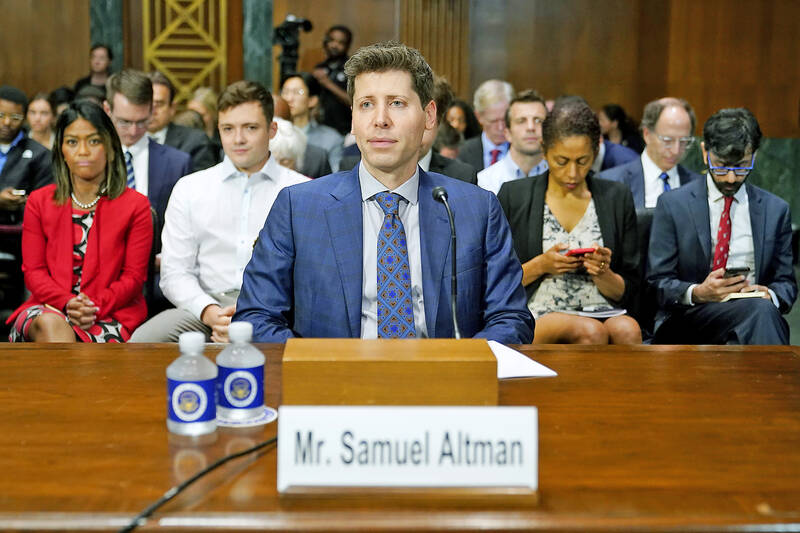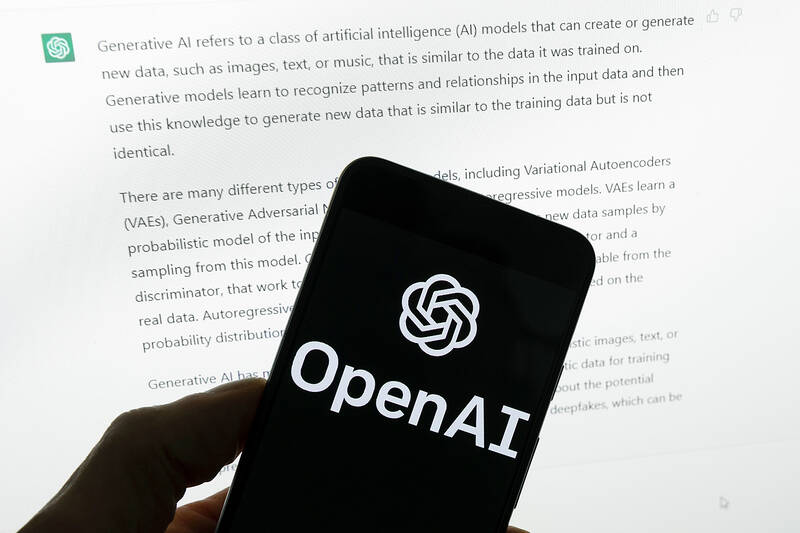An influential Silicon Valley presence for more than a decade, OpenAI CEO Sam Altman is emerging as the tech titan of the AI age, riding the wave of ChatGPT, the bot his company unleashed on the world.
Altman testified Tuesday to a US Senate Judiciary Committee panel and said artificial intelligence could be at a “printing press” moment, which would make him one of its main pioneers.
In 2015, Altman joined Tesla chief Elon Musk and others in starting OpenAI, a research company with a stated goal of building generative AI that benefits humanity.

Photo: AP
“The technological progress we make in the next 100 years will be far larger than all we’ve made since we first controlled fire and invented the wheel,” Altman said in a 2021 blog post.
STARTUP GURU
Born in 1985 into a Jewish family, Altman grew up in a St. Louis suburb, where he got his first computer at the age of eight, according to a long profile in the New Yorker from 2016.

Photo: AP
Computers and the access to online community they enable helped him navigate being gay in a conservative part of the country, Altman said in an interview with Esquire.
Like so many tech figures before him, Altman dropped out of Stanford University to start a company, Loopt, which let smartphone users selectively share their whereabouts.
Loopt was acquired in 2012 in a deal valued at US$43.4 million — and Altman’s place in Silicon Valley was secured.
Altman took a year off during which he “read many dozens of textbooks; I learned about the fields that I had been interested in,” the San Francisco resident wrote in a post.
He told of learning about nuclear engineering, synthetic biology, investing and AI.
“The seeds were planted for things that worked in deep ways later,” he said.
T-SHIRTS AND SHORTS
In 2014, Altman became president of Y Combinator, an “accelerator” that provides startups with guidance and funding in exchange for stakes in the young companies.
Altman expanded Y Combinator’s strategy for investing beyond software startups to biotech, energy, and other fields.
“He thinks quickly and talks quickly; intense, but in a good way,” said Industrial Microbes founder Derek Greenfield, who met Altman while his biotech startup was getting backing from Y Combinator.
Greenfield recalled Altman always dressing casually, sometimes in a T-shirt and shorts.
“He was very down to earth,” Greenfield said.
Altman left Y Combinator, putting his energy into artificial intelligence despite feared risks.
“He’s a very deep thinker who is incredibly focused on getting things right,” Insider Intelligence senior director of marketing and commerce Jeremy Goldman said.
Altman backed a “United Slate” political project in 2018 aimed at improving housing and healthcare policy.
He also held a fundraising event for 2020 US presidential candidate Andrew Yang, who advocated for universal basic income.
Yang “had some ideas about universal basic income that (he said) everybody needed, in part because AI was going to take the people’s jobs,” Goldman said.
Altman has proposed that combining artificial intelligence, robotics and cost-free energy could essentially enable machines to do all the work and provide a “basic income” to adults across society.
“A great future isn’t complicated: we need technology to create more wealth, and policy to fairly distribute it,” Altman wrote in a blog post.
“Everything necessary will be cheap, and everyone will have enough money to be able to afford it.”
‘FAST CARS AND SURVIVAL’
In the New Yorker article, Altman said he was a “prepper,” someone who has preparations and supplies in place to survive an apocalyptic disaster.
He has spoken of owning high-performance sports cars and renting planes to fly around California.
Altman said in a blog post that the last day of each December he writes a list of things he wants to accomplish in the year ahead.
His personal investments include startups working on fusion energy and human life extension.
“I’m super optimistic,” he said in a podcast with TED curator Chris Anderson.
“It’s always easy to doom scroll and think about how bad things are,” Altman added, “but the good things are really good and getting much better.”

Jan. 5 to Jan. 11 Of the more than 3,000km of sugar railway that once criss-crossed central and southern Taiwan, just 16.1km remain in operation today. By the time Dafydd Fell began photographing the network in earnest in 1994, it was already well past its heyday. The system had been significantly cut back, leaving behind abandoned stations, rusting rolling stock and crumbling facilities. This reduction continued during the five years of his documentation, adding urgency to his task. As passenger services had already ceased by then, Fell had to wait for the sugarcane harvest season each year, which typically ran from

It’s a good thing that 2025 is over. Yes, I fully expect we will look back on the year with nostalgia, once we have experienced this year and 2027. Traditionally at New Years much discourse is devoted to discussing what happened the previous year. Let’s have a look at what didn’t happen. Many bad things did not happen. The People’s Republic of China (PRC) did not attack Taiwan. We didn’t have a massive, destructive earthquake or drought. We didn’t have a major human pandemic. No widespread unemployment or other destructive social events. Nothing serious was done about Taiwan’s swelling birth rate catastrophe.

Words of the Year are not just interesting, they are telling. They are language and attitude barometers that measure what a country sees as important. The trending vocabulary around AI last year reveals a stark divergence in what each society notices and responds to the technological shift. For the Anglosphere it’s fatigue. For China it’s ambition. For Taiwan, it’s pragmatic vigilance. In Taiwan’s annual “representative character” vote, “recall” (罷) took the top spot with over 15,000 votes, followed closely by “scam” (詐). While “recall” speaks to the island’s partisan deadlock — a year defined by legislative recall campaigns and a public exhausted

In the 2010s, the Communist Party of China (CCP) began cracking down on Christian churches. Media reports said at the time that various versions of Protestant Christianity were likely the fastest growing religions in the People’s Republic of China (PRC). The crackdown was part of a campaign that in turn was part of a larger movement to bring religion under party control. For the Protestant churches, “the government’s aim has been to force all churches into the state-controlled organization,” according to a 2023 article in Christianity Today. That piece was centered on Wang Yi (王怡), the fiery, charismatic pastor of the